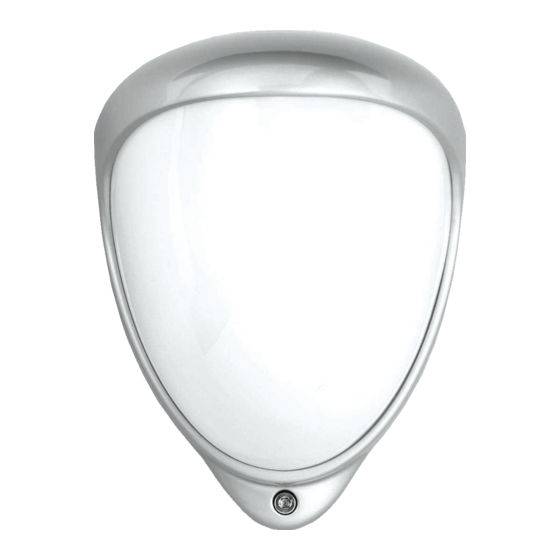
Advertisement
Quick Links
D-TECT 50
GJD350 50m Quad PIR Detector
Package contents
Package Contains:
• 1 x D-Tect 50
• 1 x Drilling template for fixing holes
• 3 x 31.75mm wall plugs
• 3 x 31.75mm screws
• 2 x Tamper Feet
• 1 x Tamper Cup
• 1 x Installation manual
Introduction
The D-Tect 50 is an outdoor motion detector and alarm
trigger that uses two independent passive infra-red
detectors, both of which must trigger to cause the detector to
signal an alarm. Utilising quad PIR technology, the D-Tect 50
delivers precise, reliable presence detection.
Quick Installation
1.
Mount and connect the detector following the instructions
given later in this sheet.
2.
Apply supply voltage to the unit. The detection LED
(blue) flashes three times.
3.
Wait approximately 2 to 3 minutes to allow the detector
to settle.
4.
Press the programming button once to activate walk
test mode. The detection LED is now enabled for five
minutes.
Note: The front cover must be fitted when walk testing.
The default settings are:
• Range: 40 meters
• Pulse count: 1 (always set to 1 during walk rest)
• Detection LED: off (always enabled during Walk Test)
• 'S' Lux Level: 5
• Contacts:
• Alarm 1: Normally Closed
• Alarm 2: Normally Open
• Contacts Timer: 5 (seconds
Mounting the Unit
WARNING
• NYLON WASHERS PROVIDED MUST BE USED WITH SCREWS
• ENSURE CABLE ENTRY AND SCREW HOLES ARE
SEALED WITH WATER BASED SEALANT
• DO NOT USE SILICONE BASED SEALANT
During installation, protect the electronics against water, as
trapped moisture can affect or damage the unit.
1.
Drill the wall to accept the two fixing screws, the cable
entry, and the tamper cup (if used). See Figures 1 and A
hole-drilling template is provided.
Note: We recommend using the tamper cup on uneven wall
surfaces.
2.
Remove the cover assembly by loosening the locking
screw. The cover hinges from the top and lifts out of the
location slot. See Figure 3.
3.
Feed standard eight-core alarm cable into the cable
entry. Bare the wires and connect to the top PCB
terminal block. See Figures 2, 4, 5 & 6.
4.
Screw the unit to the wall ensuring that the rear tamper
pin is correctly located and that the tamper microswitch
is closed. See Figure 7.
To aid installation, two spare tamper feet are provided. One
is 1mm longer and the other is 2mm longer than the tamper
foot originally fitted. The tamper foot is a push fit and can be
removed by carefully pulling it from the pin. See Figure 2.
5.
5. When the detector is aligned, connected, and
programmed to suit the installation, replace the front
cover and lock as shown. See Figure 8.
Connecting the Unit
The D-Tect 50 includes jumpers that allow you to configure
the internal end-of-line resistor values, when EOL resistors
are required. Values are 1K, 2K2, 3K3, 4K7, 5K6 and 6K8 Ω.
Figure 4 shows:
1. EOL resistor jumpers
2. Wiring points
Alternatively, you can remove the jumpers and connect a
discrete resistor directly to the alarm or tamper outputs, as
specified by the third-party equipment.
Beam Alignment
The PIR circuitry detects changes in heat and movement in
the beam pattern; therefore items such as trees, shrubs,
ponds, boiler flues, and animals should be considered when
positioning the detector.
Note: The PIR sensor is more sensitive to movement
across the beams, and less sensitive to movement directly
towards or away from the beams.
When coverage exceeds the desired detection area, adjust
the module as required to avoid unwanted detection.
-1-
Advertisement

Summary of Contents for GJD D-TECH 50
- Page 1 D-TECT 50 GJD350 50m Quad PIR Detector Package contents Drill the wall to accept the two fixing screws, the cable Package Contains: entry, and the tamper cup (if used). See Figures 1 and A • 1 x D-Tect 50 hole-drilling template is provided. •...
- Page 2 The indicator blinks twice and the changes are stored in over the field of view to obtain the correct coverage area. the D-Tect 50’s non volatile memory. Accessories GJD is able to supply the following accessories to aid installation: GJD304 Conduit cable entry adaptor ring GJD305 Pole mount clamp...
-
Page 3: Specifications
Specifications Detection Area Programmable between 25 & 50 metres. Coverage 13 degrees detection angle, 50m x 10m coverage max. Adjustment 180° pan + 90° tilt Customised Optics Double silicon shielded quad element eliminates 50,000 Lux of white light Outputs Silent solid state magnetically immune Alarm 1 &... - Page 6 Engineer Notes Technical: 01706 363990 Sales: 01706 363998 Fax: 01706 363991 Email: info@gjd.co.uk...
















Need help?
Do you have a question about the D-TECH 50 and is the answer not in the manual?
Questions and answers